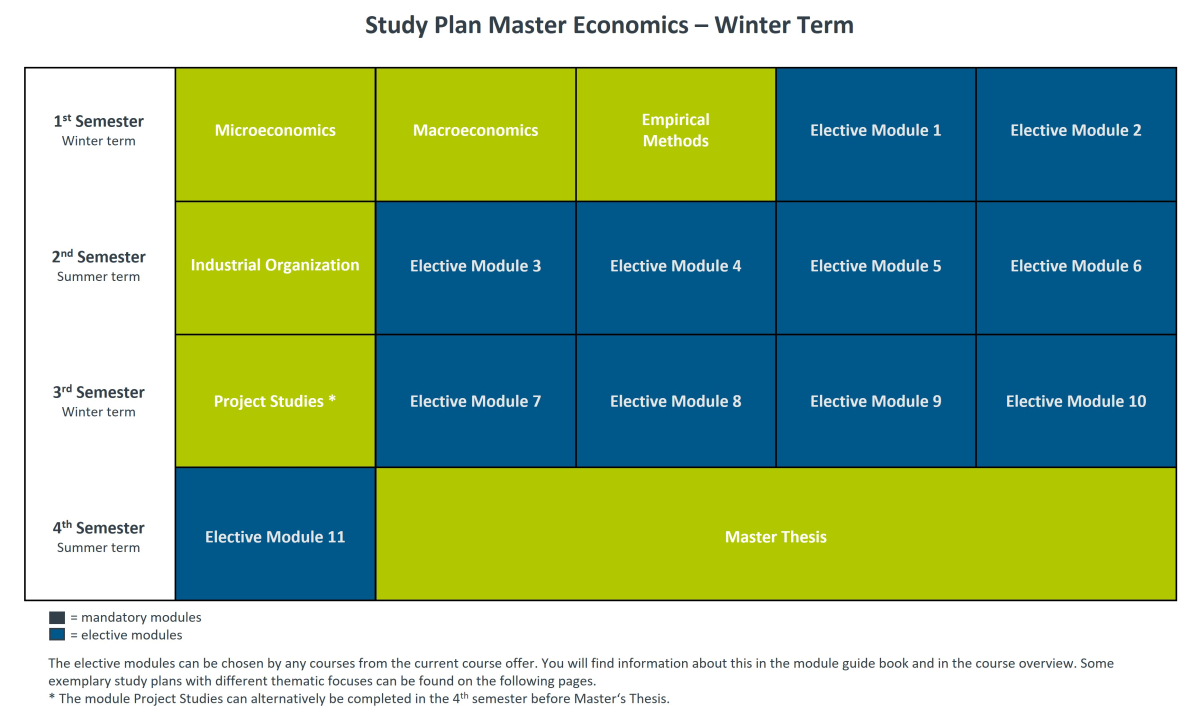Structure of the study program
On this page you will find useful information about the structure of the Master’s degree program in Economics in the two years of study, the compulsory and compulsory elective modules as well as the project studies and the Master’s thesis. You will find further details on the course of study (at the start of the winter semester) in the examination regulations, which will be an indispensable companion during your studies.
General information about the degree program
The Master’s degree program in Economics at the University of Münster generally builds on a Bachelor’s degree in Economics but is also open to graduates of related degree programs. The program is designed for four semesters and can be started in both the summer and winter semesters. Lectures, tutorials and seminars take place in the first three semesters, with a period abroad possible in the third semester. The fourth semester is reserved for project studies and the Master’s thesis. In addition to traditional lectures, the Master’s degree program in Economics in Münster is also characterized by numerous seminars, project work and an introduction to independent research. Due to the small semester size and the large selection of subjects, a very good supervision ratio is guaranteed.
The Master’s degree program is research-oriented, which is why great importance is attached to econometric knowledge, but also to a good knowledge of the theoretical foundations. It is characterized in particular by a high degree of flexibility and freedom of choice in the selection of specializations. After the four compulsory modules in the first two semesters, you have the opportunity to design your further course of study freely and individually. You can choose your 11 elective modules from over 15 subject areas with 41 modules in total. In addition to further seminars, the project study program offers you the opportunity to gain your own experience in practical scientific work, which you can then deepen and expand on independently in the final Master’s thesis.
Structure of the degree program
In the Master’s degree in Economics, students must complete 5 mandatory modules, each worth 6 ECTS, as well as the Master’s thesis worth 24 ECTS. The mandatory elements are:
- Microeconomics (winter term)
- Macroeconomics (winter term)
- Empirical Methods (winter term)
- Industrial Organization (summer term)
- Project studies (every semester): This module should be completed either at the beginning of the 4th semester or in the 3rd semester. It must be completed before the start of the Master’s thesis.
- Master’s thesis (every semester)
In addition, there are 11 compulsory elective modules with 6 ECTS each, which you can choose freely from 41 compulsory modules in total. All selectable modules can be found in the examination regulations and the course overview. You can therefore set your own strong focus in your Master’s program. These elective courses are all taught in English as well. Language requirements can be found in the admission criteria. In addition to specialization modules in micro- and macroeconomics, you can choose from numerous other areas, e.g:
- Energy and Environmental Economics
- Transport Economics
- Economic History
- Corporate Cooperation
- Econometrics and Statistics
- International Economics
- Regional Economics
- Sports Economics
- Public Economics
- Monetary Theory
- Finance
- Industrial Economics
- Politics
Overview of the elective modules available:

Each semester, as part of the 11 compulsory elective models, different seminars are also offered on a wide range of topics. The seminar program is published before each new semester. The third semester is perfectly suitable for studying abroad. The University of Münster has partner universities all over the world. You can find information about a semester abroad here.
The Project Studies module (6 ECTS) offers the opportunity to gain experience in practical academic work. It prepares students for independent academic work such as the Master’s thesis (24 ECTS), which concludes the degree program. You can find some exemplary study plans for the Economics Master’s program with different specializations here. You can find further information about the degree program on the homepage of the Faculty of Economics and on the pages of the institutes and chairs in the field of Economics in Münster.
General study plan for students starting in the winter semester:

General study plan for students starting in the summer semester:

Exemplary study plans
To make it easier to plan your studies, examples of study plans with different specializations are shown here. By creating two to three thematic specializations, the content of the degree program can be aligned more closely to future potential professional fields. All plans are suggestions. Each compulsory elective module can be replaced by an alternative compulsory elective module. Please also check the homepages of the chairs/institutes and the course overview to find out whether and when the respective courses and which additional courses are offered.
-
Example 1: Emphasis on Economic Policy and Regulation
Emphasis on Economic Policy and Regulation

-
Example 2: Emphasis on Microeconomics and Public Economics
Emphasis on Microeconomics and Public Economics

-
Example 3: Emphasis on Macroeconomics
Emphasis on Macroeconomics

-
Example 4: Emphasis on Econometrics and Methods
Emphasis on Econometrics and Methods

-
Example 5: Emphasis on Transport and Energy Economics
Emphasis on Transport and Energy Economics

-
Example 6: Emphasis on Econometrics and Finance
Emphasis on Econometrics and Finance

You can find sample study plans for students starting in the summer semester here.


